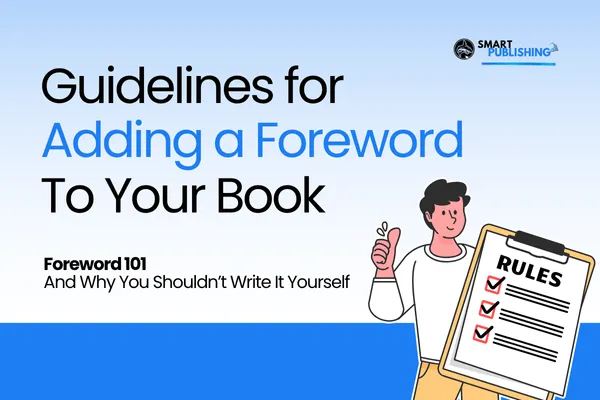
Guidelines for Adding a Foreword to Your Book
Guidelines for Adding a Foreword to Your Book
Foreword 101 (And Why You Shouldn’t Write It Yourself)
Adapted from The Smart Publishing Impact Series – Episode 28
Let’s clear something up right away: It’s spelled foreword—not forward like a direction.
The word literally means “before the word.” It’s the opening before the main content of your book. And here’s the most important thing you need to know:
You don’t write your own foreword.
In this blog, I’m breaking down everything you need to know about a book’s foreword—what it is, who should write it, how to ask someone to write it, and what makes a strong one. I’ll even share a real example from a bestselling book we helped publish.
What Is a Foreword, Really?
A foreword is an outside voice speaking directly to your reader. Think of it like an endorsement. It adds credibility, trust, and context to your book. It usually appears before the introduction and serves as a “Hey, you should really read this book—and here’s why.”
Unlike the introduction (which you write), the foreword is meant to be:
Written by someone else
From their personal or professional point of view
Focused on why you and your book matter
Who Should Write Your Foreword?
Ideally, someone with:
Industry influence (if your book is professional or thought-leadership based)
Personal connection (if your book is memoir or heartfelt)
Credibility in your topic area
A strong voice that aligns with your message
Yes, it’s great to land a big-name influencer. But sometimes the best foreword comes from someone close to you who walked through the journey with you—like your spouse, mentor, or business partner.
💡 Example: In Reclaiming My Authentic Self, the foreword was written by the author’s wife—because she lived that story with him. And it was perfect.
When to Start Asking for a Foreword
Earlier than you think.
You don’t need to finish your manuscript before reaching out. Once you have your introduction and first two chapters, that’s often enough to give your foreword writer the context they need.
Waiting until the end can delay your entire production timeline. We've had authors scrambling for a foreword days before launch—and it's totally avoidable.
How to Ask Someone to Write a Foreword
When you reach out, include:
A personal message explaining why you’re asking them
A short sample of your manuscript (intro + a chapter)
A rough idea of what you’d love them to highlight
A clear deadline
Reassurance that your team can help polish it if needed
Pro tip: We offer ghostwritten forewords for our clients all the time. All we need is a few bullet points and a little context—and we’ll draft something they can approve and personalize.
Guidelines to Give Your Foreword Writer
Want to make it easy for them? Share this checklist:
Open with your connection to the author.
“I first met [Author] in [context] and was immediately struck by…”Explain why you’re writing the foreword.
Why this book? Why this person? Why now?Share your impressions of the manuscript.
What stood out? What moved you? What’s the big takeaway?Speak to the author’s credibility.
Talk about the author’s experience, heart, vision, or leadership.Set expectations for the reader.
What will the reader walk away with? Why should they keep reading?Keep it short.
1 to 1.5 pages is perfect—just one page in Microsoft Word is often enough.Sign off with name + title.
This gives extra credibility, especially if your writer has professional credentials.
Real Example: A Foreword That Works
Let me read you a quick excerpt from the foreword in Healing in the Wild by Dr. Carter Check, written by Don Rea Jr., President of PGA of America:
“I first met Dr. Carter Check in Washington, D.C., when he became a PGA HOPE Ambassador. From that moment, I knew we shared a passion for helping veterans and first responders… Healing in the Wild captures the powerful connection between outdoor therapy and overcoming trauma. I’m honored to support this book because I know it saves lives.”
See how personal, specific, and heartfelt that is? It offers credibility and warmth. That’s what a great foreword does.
Final Takeaways
A foreword is not optional if you want to elevate your book's credibility.
It should never be written by the author.
Ask early, guide your writer, and don’t overcomplicate it.
When in doubt, we can help ghostwrite or polish one for you.
Remember, your reader hasn’t met you yet. A foreword introduces you before you even say a word.
And done well, it can be the nudge that turns browsers into buyers.
Keep writing your story—because the world needs your voice.
—Renee
